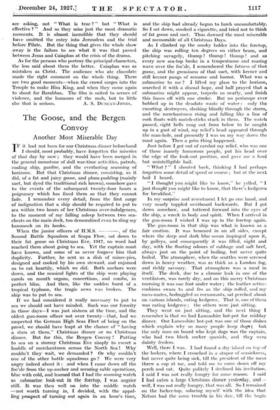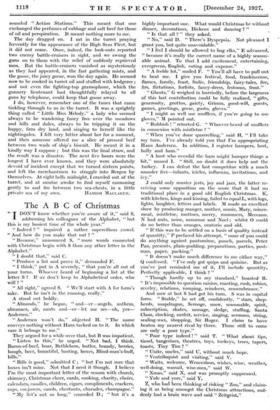The Goose, and the Bergen Convoy
Another Most Miserable Day
TF it had not been for our Christmas dinner beforehand I should, most probably, have forgotten the miseries of that day by now ; they would have been merged in the general monotone of dull war-time activities, patrols, coaling ship, gunfire, and the everlasting scanning of horizons. But that Christmas dinner, consisting, as it did, of a fat and juicy goose, and plum-pudding (mainly suet, but dyed the traditional rich brown), somehow gave to the events of the subsequent twenty-four hours a poignancy which has fixed them so that they cannot fade. I remember every detail, from the first surge of indignation that a ship should be required to put to sea within two hours of her Christmas over-indulgences, to the moment of my falling asleep between two sea-. chests on the main deck, too demoralized even to sling my hammock on its hooks.
When the junior officers of H.M.S. , of the Second Battle Squadron at Scapa Flow, sat down to their fat goose on Christmas Eve, 1917, no word had reached them about going to sea. Yet the captain must have known, and some of us never forgave him that duplicity. Further, he sent. us a dish of mince-pies, designed and cooked by his own steward, and enjoined us to eat heartily, which we did. Both anchors were down, and the musical lights of the ship were playing carols on mouth organs, concertinas, and combs, in perfect bliss. And then, like the sudden burst of a tropical typhoon, the tragic news was broken. The ship was to put to sea.
If we had considered it really necessary to put to sea we should not have minded. Such was our ferocity in those days—I was just sixteen at the time, and the oldest- gun-room officer not over twenty—that, had we suspected the German High Seas Fleet of being on the prowl, we should have leapt at the chance of "having a slam at them," Christmas dinner or no Christmas dinner. But for this, the Bergen Convoy ! Putting to sea on a stormy Christmas Eve simply to escort a huddle of merchantmen across the North Sea ! Why couldn't they wait, we demanded ? Or why couldn't one of the other battle squadrons go ? We were very angry indeed about it : and when I came down off the foc'sle from the up-anchor and securing cable operations, blue with cold, and learned that I had the morning watch as submarine look-out in the foretop, I was angrier still. It was then well on into the middle watch —not worth turning in, I decided, with the appal- ling prospect of turning out again in an hour's time, and the ship had already begun to lurch uncomfortably. So I sat down, smoked a cigarette, and tried not to think of fat goose and suet. Thus dawned the most miserable and memorable of all Christmas Days.
As I climbed up the smoky ladder into the foretop; the ship was rolling ten degrees on either beam, and pitching savagely, thump ! thump ! thump ! and as every new sea-top broke in a tempestuous and roaring wave over the foe'sle, I remembered the fatness of that goose, and the greasiness of that suet, with keener and still keener pangs of remorse and horror. What was a submarine to me ? I lifted my glass to the horizon, searched it with a dismal hope, and half prayed that a submarine might appear, torpedo us neatly, and finish this fiasco off with one stroke. But no periscope ever bobbed up in the desolate waste of water : only the escorting destroyers, slashing blindly through the storm, and the merchantmen rising and falling like a line of cork floats with match-sticks stuck in them. The watch passed, eight bells rang out from below to be caught up in a gust of wind, my relief's head appeared through the man-hole, and presently I was on my way down the mast again. Then a grim thing happened.
Just before I got out of earshot my relief, who was one of those inanely humorous people, put his head over the edge of the look-out position, and gave me a loud but unintelligible hail.
" What ? " I shouted back, thinking I had perhaps forgotten some detail of speed or course ; but at the next hail I heard.
"I thought you might like to know," he yelled, "1 just thought you might like to know, that there's kedgeree for breakfast."
In my surprise and resentment I let go one hand, and very nearly toppled overboard backwards. But I got down somehow, and tottered forward into the eyes of the ship, a wreck in body and spirit. When I arrived in the gun-room I wished I was up in the foretop again.
The gun-room in that ship was what is known as a fair caution. It was hemmed in on all sides, except where the deep and dark blue ocean impinged upon it, by galleys, and consequently it was filled, night and day, with the floating odours of cabbage and salt beef, always just on the point of boiling, but never quite boiled. The atmosphere, when the scuttles were screwed down in heavy weather, was as thick as a London fog, and richly savoury. That atmosphere was a meal in itself. The deck, due to a chronic leak in one of the ventilators, was rarely dry, and on this merry Christmas morning it was one foot under water ; the leather settee- cushions swam to and fro as the ship rolled, and my mess-mates, bedraggled as cormorants, sat perched about on various islands, eating kedgeree. That is, one of them was eating kedgeree; the others were just sitting.
They went on just sitting, and the next thing I remember is that we had Lancashire hot-pot for midday dinner. Our Lancashire hot-pot was one of those dishes which explain why so many people keep dogs: but the only man on board who kept dogs was the captain, who had two black cocker spaniels, and they were dainty feeders.
Well, there I was. I had found a dry island on top of the lockers, where I crouched in a stupor of seasickness, but never quite being sick, till the president of the mess threw a cap at me, and told me to come down off my perch and eat. Quite politely I declined his invitation. I said I was not really hungry for some reason. I said I had eaten a large Christmas dinner yesterday, and-- well, I was not really hungry, that was all. So I remained on the locker-top, solacing myself with the idea that Nelson had the same trouble in his • day, till the buffle sounded "Action Stations." This meant that one exchanged the perfumes of cabbage and salt beef for those of oil and perspiration. It meant nothing more to me.
The day dragged on. I sat in the turret praying fervently for the appearance of the High Seas Fleet, but it did not come. Once, indeed, the look-outs reported two enemy battle-cruisers in sight, and we swung the guns on to them with the relief of suddenly reprieved men. But the battle-cruisers vanished as mysteriously as they had appeared, in the fast gathering mists, and the goose, the juicy, goose, won the day again. He seemed now to be cooked in turret oil and stuffed with kedgeree ; and not even the fighting-top gramophone, which the gunnery lieutenant had thoughtfully relayed to all guns by telephone, could keep that goose away.
I do, however, remember one of the tunes that came tinkling through to us in the turret. It was a sprightly thing called "Little Miss Melody," a lady who seemed always to be wandering fancy free over the meadows and hills and dales, always to be tripping it on the happy, firm dry land, and singing to herself like the nightingales. I felt very bitter about her for a moment, and then someone offered me a slice of pressed beef between two wads of ship's biscuit. He meant it in a kindly way I suppose ; but this was the final straw, and the result was a disaster. The next five hours were the longest I have ever known, and they were absolutely devoid of incident except that we turned sixteen points, and left the merchantmen to straggle into Bergen by themselves. At eight bells midnight, I crawled out of the turret, and at sunrise awoke to find myself cannoning gently to and fro between two sea-chests, in a little































 Previous page
Previous page